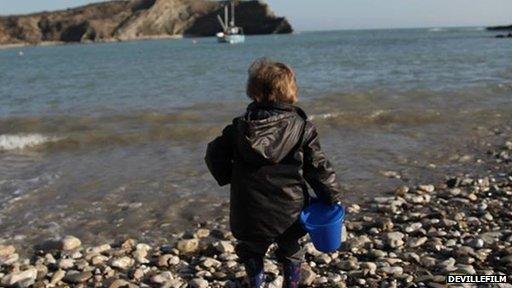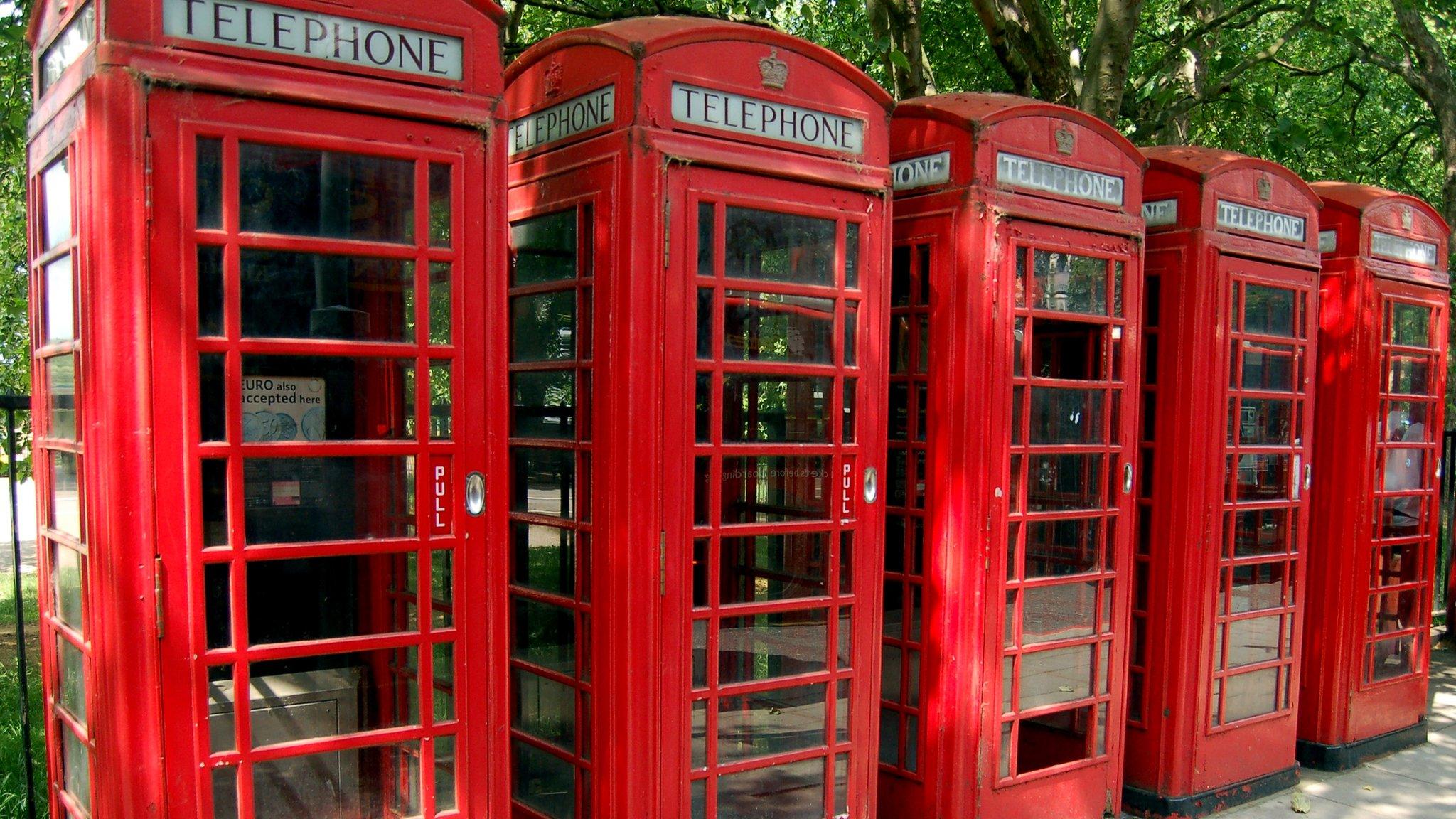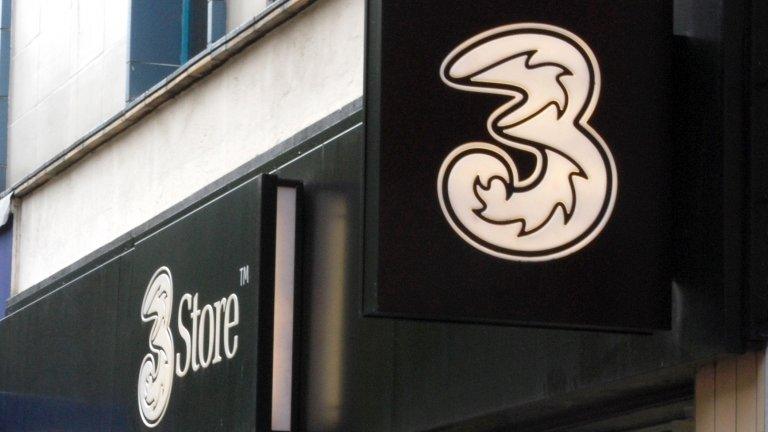The cost of data roaming inside the UK
- Published
Why does my phone think it is abroad?
It's a beautiful spring day at Lulworth Cove, a striking part of the Jurassic Coast, which stretches across south Dorset and Devon in the UK.
Visitors are scouring its pebble beach for fossils and taking photos of the stripes of rock strata embedded in the surrounding cliffs - a visual reminder of millions of years of history.
And they are all asking each other the same question: "What time is it?"
The clocks on our phones have reset themselves to French time, and for the surprising number who are not wearing watches, the confusion is palpable.
Then the phones start beeping. "Welcome to France!" read the incoming text messages. "Your roaming costs are..."
Inadvertent roaming
Inadvertent roaming, as it is called, is surprisingly common in this part of the country, despite France itself being a fair distance away - there are 74 miles (119km) between Poole and Cherbourg, a popular ferry route.

Data roaming costs can soon add up
Visitors to the surrounding areas, including Portland near Weymouth, can find themselves suddenly connected to French networks, and, if they're not careful, run up their phone bills with every phone call, text and social network update being charged as if it was made from abroad.
It's not only a problem along the south coast of England - residents and visitors along the borders of Northern Ireland face substantial issues with their phones connecting to Irish networks, often without them even realising it.
In 2012 research carried out there by industry regulator Ofcom found that on average those affected were spending £300 a year each on accidental data roaming, and only 11% of them had thought to switch the service off on the phone itself.

Lulworth Cove in Dorset - not to be confused with France
The worst affected areas were east and north County Londonderry - notably Portstewart, south County Armagh and south County Down.
'Reasonable steps'
"The EU Roaming Regulation requires that mobile operators take reasonable steps to protect their customers from paying roaming charges for inadvertently accessed roaming services while situated in their home member state, and to make information available to their customers on how to avoid inadvertent roaming in border regions," said an Ofcom representative.
With the EU looking to lower the existing cap on data roaming charges this summer, inadvertent roaming may soon become a less expensive accident - and for local residents it can be something of a mixed blessing.
Daff Tambling lives in the popular walkers' haven of Worth Matravers, to the east of Lulworth. The village played a key role in the development of the use of radar during World War Two - but it is no longer a hotspot for communications technology.

Daff Tambling gets a French signal inside her Dorset home
"On certain windowsills in certain weather conditions I can just about get enough UK signal to receive a text," she said.
"The phone has to stay at the same angle."
Ms Tambling estimates that most days she will end up with either a French connection - or nothing at all.
"It preserves a stillness - there's something nostalgic and romantic about it. I quite like it on many levels," she added.
"But when it gets irritating is when companies are increasingly relying on texting you. If you need to verify your PayPal account or change your email password... even with deliveries and doctors' appointments, they want to remind you by text. I can't engage with any of that. That can be really frustrating."
She also feels short-changed by deals offered by UK mobile phone providers.
"Tariffs have no value for me at all. They are useless to me. It doesn't matter if I can get 5,000 free UK texts because I can't send them."
Water waves
So why is the French mobile signal spilling over? The answer is fairly straight forward - but difficult to counter.
"Radio propagation over water is much easier than propagation over land since we don't have the hills and buildings in the way," said Andrew Nix, professor of wireless communication systems at the University of Bristol.
"Base station powers can actually go many tens of kilometres if there are no blocking objects in the way."

Mobile phone signals travel more easily across the open water
"If the French base station can 'see' the coastline they can actually generate quite strong signals in coastal regions of the UK. We've done wi-fi tests over 15km [9 miles] from coastline to coastline, yet I often can't go 7m [23ft] from one end of my house to the other."
Mobile network O2 confirmed that its nearest masts in the Purbeck area were further inland, while EE pointed out that it had no control over French transmitters.
The advice of the mobile phone companies and industry regulator Ofcom is to switch off data roaming - but it's not necessarily something you would think to do within the borders of your home country.
"There are a number of ways that consumers can avoid incurring roaming costs, including by switching their phone to 'manual' rather than 'automatic' network selection," said Ofcom.
"However this may restrict the use of the phone."
It points to a guide on its website, external that demonstrates how to deactivate specific mobile devices.
The anomaly is also familiar to those who live in Dover.
Sam Wydymus, who owns the cliff-top Coastguard pub, just 23 miles from Calais said: "We keep our phones switched off.
"On the left hand side of the White Cliffs you get a strong French signal but no British one at all. Those who live here and can afford it have French and British mobile phones. They keep the French phone at home and take the British phone when they go to work in London."
British TV and radio reception is equally elusive, Ms Wydymus added.
"We only get [BBC] Radio 4," she said, "and I have never seen EastEnders."
- Published11 March 2013

- Published15 June 2013

- Published4 December 2013

- Published18 July 2012
